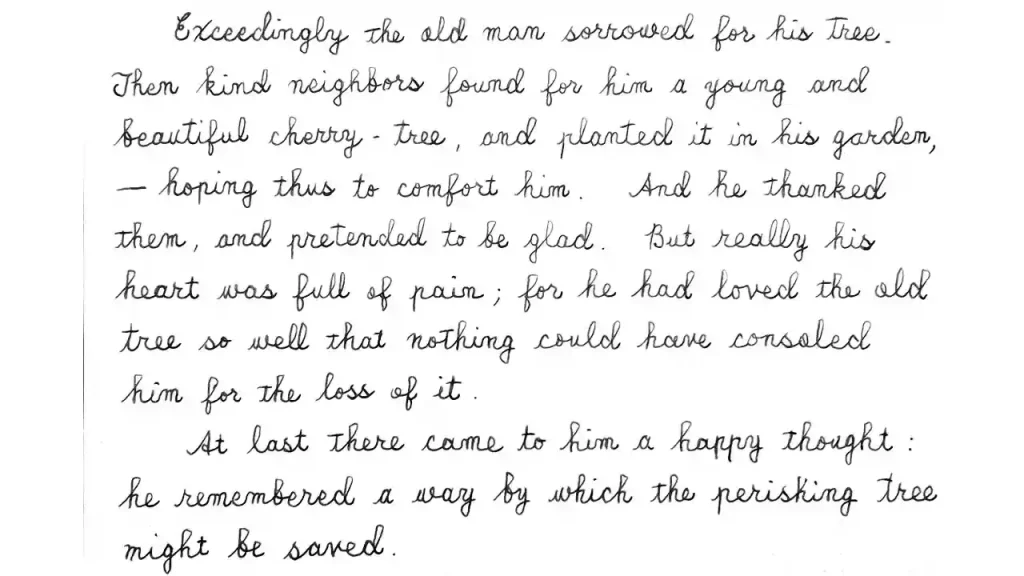Exceedingly the old man sorrowed for his tree.
JIU-ROKU-ZAKURA
- subject: ろうじん
- predicate: かなしい
日本語訳:
その老人は枯れた木の事をたいそう悲しみました。
Then kind neighbors found for him a young and beautiful cherry-tree, and planted it in his garden,—hoping thus to comfort him.
- subject: りんじん
- predicate: うえる
- modifier: さくらを
すると、親切な隣人たちが若くて美しい桜の木を彼のために見つけて、彼の庭に植えてくれました。彼を元気づけようとして。
- 隣人 / rinjin (りんじん, neighbor)
And he thanked them, and pretended to be glad.
- subject: ろうじん
- predicate: よろこぶふりをする
彼は隣人たちに感謝して、喜ぶフリをしました。
- 感謝する / kansha suru (かんしゃする, thank/gratitude)
- 喜ぶ / yorokobu (よろこぶ, rejoice/be glad)
But really his heart was full of pain; for he had loved the old tree so well that nothing could have consoled him for the loss of it.
- modifier: ほんしんでは
- subject: かれ
- predicate: かなしい
しかし、本心では、彼は苦痛でいっぱいでした。彼はその古木を愛していたので、彼を慰められるものは何もなかったのです。
- 本心 / honshin (ほんしん, true feelings/real intention)
- 苦痛 / kutsuu (くつう, pain/agony)
At last there came to him a happy thought: he remembered a way by which the perishing tree might be saved. (It was the sixteenth day of the first month.)
- subject: かれ
- predicate: おもいだす
- modifier: きを・たすけるほうほう
とうとう、彼は幸せな考えを思いつきました。彼は枯れている木を助ける方法を思い出しました。
(それは一月十六日のことでした)
Along he went into his garden, and bowed down before the withered tree, and spoke to it, saying:
- subject: かれ
- predicate: はなしかける
- modifier: きに
彼は庭に向かい、枯れ木の前で頭を下げて、木に話しかけました。
“Now deign, I beseech you, once more to bloom,—because I am going to die in your stead.”
- subject: わたし
- predicate: しぬ
- modifier: かわりに
「お願いします。もう一度開花してください。私があなたの代わりに死にますから」
(For it is believed that one can really give away one’s life to another person, or to a creature or even to a tree, by the favor of the gods;—and thus to transfer one’s life is expressed by the term migawari ni tatsu, “to act as a substitute.”)
- subject: かれ
- predicate: みがわりになる
人間は他人や動物や木に自分の命をゆずることができる、神の助けを経て。そう信じられています。
このようにして、人の命を譲り渡すことは、身代わりにたつという言葉で表現されます。
- 譲り渡す / yuzuriwatasu (ゆずりわたす, transfer/hand over)
Then under that tree he spread a white cloth, and divers coverings, and sat down upon the coverings, and performed hara-kiri after the fashion of a samurai.
- subject: かれ
- predicate: はらをきる
そのあと、その木の下で、彼は一枚の白い布と何枚かの敷物を広げて、その敷物の上に座り、サムライにならってハラキリを行いました。
And the ghost of him went into the tree, and made it blossom in that same hour.
- subject: ゆうれい
- predicate: かいかさせる
彼の幽霊はその木に入って、開花させました。
And every year it still blooms on the sixteenth day of the first month, in the season of snow.
そして毎年、冬季の一月十六日に、その木は開花します。
Reference : Kwaidan by Lafcadio Hearn (project gutenberg)
English Story With Easy Japanese Translation
